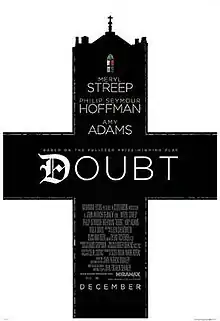Doubt (2008 film)
Doubt is a 2008 American drama film written and directed by John Patrick Shanley, based on his Pulitzer Prize-winning and Tony Award-winning 2004 stage play Doubt: A Parable. Produced by Scott Rudin, the film takes place in a Roman Catholic elementary school named for St. Nicholas led by Sister Aloysius (Meryl Streep). Sister James (Amy Adams) tells Aloysius that Father Flynn (Philip Seymour Hoffman) might be paying too much attention to the school's only black student, Donald Miller (Joseph Foster), thus leading to Aloysius investigating Flynn's behaviour. The film also features Viola Davis as Donald Miller's mother, Mrs. Miller.
| Doubt | |
|---|---|
 Theatrical release poster | |
| Directed by | John Patrick Shanley |
| Produced by | Scott Rudin |
| Screenplay by | John Patrick Shanley |
| Based on | Doubt: A Parable by John Patrick Shanley |
| Starring | |
| Music by | Howard Shore |
| Cinematography | Roger Deakins |
| Edited by | Dylan Tichenor |
Production company | |
| Distributed by | Walt Disney Studios Motion Pictures |
Release date |
|
Running time | 104 minutes[1] |
| Country | United States |
| Language | English |
| Budget | $20 million |
| Box office | $50.9 million[2] |
The film premiered October 30, 2008, at the AFI Fest before being distributed by Miramax Films in limited release on December 12 and in wide release on December 25. Grossing $50.9 million against a budget of $20 million, the film received largely positive reviews from critics. Streep, Hoffman, Adams, and Davis were heavily praised for their performances, and all were nominated for Oscars at the 81st Academy Awards. Shanley was also nominated for Best Adapted Screenplay.
Plot
In 1964 at a Catholic church in The Bronx, New York, Father Brendan Flynn gives a sermon on the nature of doubt, noting that it, like faith, can be a unifying force. Sister Aloysius, the strict principal of the church's parish school, becomes concerned when she sees a boy pull away from Flynn in the school courtyard. She instructs her Sisters to be alert to suspicious activity in the school.
Sister James, a young and naive teacher, receives a request for Donald Miller, an altar boy and the school's only African-American student, to meet Flynn in the rectory. Donald returns to class visibly upset, and James notices the smell of alcohol on his breath. Later, she sees Flynn placing an undershirt in Donald's locker. She reports her suspicions to Aloysius.
The ruse to get Flynn into the office to talk about Miller is that Aloysius wants to talk about the Christmas pageant. Flynn wants secular songs in the pageant, like Santa Claus Is Comin' to Town or Frosty the Snowman. Aloysius thinks Frosty is a pagan song advocating magic and should be banned from the airwaves. Sister James is more open to Flynns opinion, that the church needs to adapt to the changing times, to allow the children to connect with them. Aloysius says Christmas is about Christ, so all songs should be religious.
Flynn gets an idea for a sermon on intolerance listening to Aloysius and he writes it in a little book with a ballpoint pen. Flynn tells Aloysius it is a new time and that something inside people has changed. He thinks they should sing songs from the radio, take the kids out for ice cream, and also take the boys camping. Flynn says religious people need to relate to the people in the working class neighborhood they are in. Aloysius says there's no way they can do that, because religious people are different, period.
Getting onto what she really wanted to talk about, Aloysius brings Donald Miller up, and says they must be very careful how he will be used: can't hide him, but can't put him right up front either because either way they would make him feel self conscious as the only black child in the school. Aloysius says they must be careful not to make him feel singled out because even Flynn himself singles Donald Miller out for special treatment, like that private meeting the two had last week. Aloysius meets with Donald's mother regarding her suspicions and is shocked by her seeming disinterest in Flynn's alleged abuse, so long as her son can finish the term. Mrs. Miller admits that she would not intervene against the abuse, if it existed, in order to keep Donald in a school that will better his socioeconomic situation and shield him from bullies. She tearfully asserts that Flynn is the only man who has ever shown her son kindness. Mrs. Miller intimates that she knows Donald is gay, and she fears that his physically abusive homophobic father would kill him if he knew anything happened with Flynn.
Aloysius confronts Flynn and demands his resignation. He furiously denies all her allegations and accuses her of insubordination, asking her if she has ever committed a mortal sin. She claims to have contacted a nun from one of his previous parishes who corroborated her suspicions, and threatens to visit his previous appointments and contact parents, asserting that she will do whatever it takes to force him out. Acknowledging that his downfall would be inevitable should he ignore her threats, Flynn agrees to request a transfer and delivers a final sermon before departing.
Some time later, Aloysius tells James that Flynn has been appointed to a more prestigious position at a larger church. She admits to having lied about contacting a nun at Flynn's former church to coerce him into resigning, but believes his resignation is proof of his guilt. She then breaks down in tears, saying to James, "I have doubts...I have such doubts."
Cast
_(cropped).jpg.webp)

_(cropped).jpg.webp)

- Meryl Streep as Sister Aloysius Beauvier, the parish school principal
- Philip Seymour Hoffman as Father Brendan Flynn
- Amy Adams as Sister James, a teacher at the school
- Viola Davis as Mrs. Miller, Donald Miller's mother
- Joseph Foster as Donald Miller, the school's first black student
The other sisters in the film include, Alice Drummond as Sister Veronica, Audrie J. Neenan as Sister Raymond, and Helen Stenborg as Sister Teresa. The child actors who played the students of the school include Mike Roukis as William London, Frank Shanley as Kevin, Frank Dolce as Ralph, Paulie Litt as Tommy Conroy, Matthew Marvin as Raymond, Bridget Clark as Noreen Horan, Molly Chiffer and Sarah, and Lydia Jordan as Alice. The actors who played the other staff of the school include, Susan Blommaert as Mrs. Carson, Carrie Preston as Christine Hurley, John Costelloe as Warren Hurley, Margery Beddow as Mrs. Shields, Marylouise Burke as Mrs. Deakins, and Jack O'Connell as Mr. McGuinn.
Production
Production began on December 1, 2007.[3] The film, which concentrates on a Bronx Catholic school, was filmed in various areas of the Bronx, including Parkchester, St. Anthony's Catholic School, and the College of Mount Saint Vincent, as well as Bedford-Stuyvesant, Brooklyn.[4] The "garden" exterior scenes were shot at the historic Episcopal Church St. Luke in the Fields on Hudson Street in New York's Greenwich Village. The associated St. Luke's School was also heavily featured. The film is dedicated to Sister Margaret McEntee, a Sister of Charity who was Shanley's first-grade teacher and who served as a technical adviser for the movie, after whom Shanley modeled the character of Sister James.
Reception
On Rotten Tomatoes, the film has an 80% approval rating based on 217 reviews, with an average rating of 6.99/10. The site's consensus reads, "Doubt succeeds on the strength of its top-notch cast, who successfully guide the film through the occasional narrative lull."[5] Another review aggregator, Metacritic, gave the film a 68/100 approval rating based on 36 reviews.[6] Critic Manohla Dargis of The New York Times concluded that "the air is thick with paranoia in Doubt, but nowhere as thick, juicy, sustained or sustaining as Meryl Streep's performance."[7] Meryl Streep's performance as the stern, intimidating and bold principal Sister Aloysius Beauvier was praised, as were Philip Seymour Hoffman and Amy Adams's performances.
Viola Davis's performance as Mrs. Miller was praised by critics; Salon magazine declared that the character was acted with "a near-miraculous level of believability ... Davis, in her small, one-scene role, is incredibly moving—I can barely remember a Davis performance where I haven't been moved ... [she] plays her character, an anxious, hardworking woman who's just trying to hold her life and family together, by holding everything close. She's not a fountain of emotion, dispensing broad expression or movement; instead, she keeps it all inside and lets us in".[8]
National Public Radio called Davis's acting in the movie "the film's most wrenching performance ... the other [actors] argue strenuously and occasionally even eloquently, to ever-diminishing effect; Davis speaks plainly and quietly, and leaves [no] doubt that the moral high ground is a treacherous place to occupy in the real world".[9]
Roger Ebert, who thought Davis's performance worthy of an Academy Award, gave the film four stars, his highest rating, and praised its "exact and merciless writing, powerful performances and timeless relevance. It causes us to start thinking with the first shot", he continued, "and we never stop".[10] Ebert goes on to say, "The conflict between Aloysius and Flynn is the conflict between old and new, between status and change, between infallibility and uncertainty. And Shanley leaves us doubting."[11]
The film and the cast earned numerous awards and nominations including five Academy Award nominations: for Best Actress for Streep, Best Supporting Actor for Hoffman, Best Supporting Actress for both Adams and Davis, and Best Adapted Screenplay for Shanley.
The scholar Daniel Cutrara, in his book on sex and religion in cinema, commented that the film works as a metaphor for worldwide uncertainty over priests accused of pedophilia—specifically through Father Flynn's resignation as an indication of guilt and then Sister Aloysius's subsequent doubt.[12]
Awards
Doubt received five Academy Awards nominations on January 22, 2009, for its four lead actors and for Shanley's script. It was the fourth film to date—following My Man Godfrey (1936), I Remember Mama (1948), and Othello (1965)—to receive four acting nominations without being nominated for Best Picture.
| Award | Category | Recipient(s) | Result |
|---|---|---|---|
| Academy Awards | Best Actress | Meryl Streep | Nominated |
| Best Supporting Actor | Philip Seymour Hoffman | Nominated | |
| Best Supporting Actress | Amy Adams | Nominated | |
| Viola Davis | Nominated | ||
| Best Adapted Screenplay | John Patrick Shanley | Nominated | |
| BAFTA Awards | Best Leading Actress | Meryl Streep | Nominated |
| Best Supporting Actor | Philip Seymour Hoffman | Nominated | |
| Best Supporting Actress | Amy Adams | Nominated | |
| Chicago Film Critics Association Awards | Best Actress | Meryl Streep | Nominated |
| Best Supporting Actor | Philip Seymour Hoffman | Nominated | |
| Best Supporting Actress | Amy Adams | Nominated | |
| Viola Davis | Nominated | ||
| Best Adapted Screenplay | John Patrick Shanley | Nominated | |
| Critics' Choice Awards | Best Picture | Doubt | Nominated |
| Best Actress | Meryl Streep | Won | |
| Best Supporting Actor | Philip Seymour Hoffman | Nominated | |
| Best Supporting Actress | Viola Davis | Nominated | |
| Best Acting Ensemble | Amy Adams, Viola Davis, Philip Seymour Hoffman and Meryl Streep | Nominated | |
| Best Writer | John Patrick Shanley | Nominated | |
| Dallas-Fort Worth Film Critics Association Awards | Best Supporting Actress | Viola Davis | Won |
| Detroit Film Critics Society Awards | Best Actress | Meryl Streep | Nominated |
| Best Supporting Actress | Amy Adams | Nominated | |
| Golden Globe Awards | Best Performance by an Actress in a Motion Picture – Drama | Meryl Streep | Nominated |
| Best Performance by an Actor in a Supporting Role in a Motion Picture | Philip Seymour Hoffman | Nominated | |
| Best Performance by an Actress in a Supporting Role in a Motion Picture | Amy Adams | Nominated | |
| Viola Davis | Nominated | ||
| Best Screenplay – Motion Picture | John Patrick Shanley | Nominated | |
| Houston Film Critics Society Awards | Best Supporting Actress | Viola Davis | Won |
| Best Cast | Amy Adams, Viola Davis, Philip Seymour Hoffman and Meryl Streep | Won | |
| National Board of Review Awards | Breakthrough Performance by an Actress | Viola Davis | Won |
| Best Cast | Amy Adams, Viola Davis, Philip Seymour Hoffman and Meryl Streep | Won | |
| Palm Springs International Film Festival | Spotlight Award | Amy Adams | Won |
| Phoenix Film Critics Society Awards | Best Actress | Meryl Streep | Won |
| Satellite Awards | Best Actress in a Motion Picture – Drama | Meryl Streep | Nominated |
| Best Actor in a Supporting Role | Philip Seymour Hoffman | Nominated | |
| Best Screenplay – Adapted | John Patrick Shanley | Nominated | |
| Screen Actors Guild Awards | Outstanding Performance by a Female Actor in a Leading Role | Meryl Streep | Won |
| Outstanding Performance by a Male Actor in a Supporting Role | Philip Seymour Hoffman | Nominated | |
| Outstanding Performance by a Female Actor in a Supporting Role | Amy Adams | Nominated | |
| Viola Davis | Nominated | ||
| Outstanding Performance by a Cast in a Motion Picture | Amy Adams, Viola Davis, Philip Seymour Hoffman and Meryl Streep | Nominated | |
| St. Louis Gateway Film Critics Association Awards | Best Supporting Actress | Amy Adams | Nominated |
| Viola Davis | Won | ||
| Washington D.C. Area Film Critics Association Awards | Best Actress | Meryl Streep | Won |
| Best Cast | Amy Adams, Viola Davis, Philip Seymour Hoffman and Meryl Streep | Won |
References
- "Doubt (15)". British Board of Film Classification. December 18, 2008. Retrieved October 4, 2016.
- "Doubt". Box Office Mojo. January 4, 2009. Retrieved October 7, 2011.
- Pincus-Roth, Zachary (April 19, 2007). "Meryl Streep and Philip Seymour Hoffman to Star in Doubt Film". Playbill. Archived from the original on April 27, 2007. Retrieved February 7, 2008.
- "The benefit of the 'Doubt'". Daily News (New York). February 5, 2008. Retrieved February 7, 2008.
- "Doubt – Movie Reviews". Rotten Tomatoes. Retrieved June 22, 2020.
- "Doubt (2008):Reviews". Metacritic. December 30, 2008. Retrieved December 30, 2008.
- The New York Times Movie Review of Doubt, Dec 12, 2008
- Madden, Mike (December 12, 2008). "Stephanie Zacharek". Salon.com. Retrieved April 27, 2010.
- "Viola Davis Tackles Fear, Shines In 'Doubt'". NPR. December 10, 2008. Retrieved April 27, 2010.
- Ebert review
- "Doubt", Roger Ebert.com
- Cutrara, Daniel S. (March 15, 2014). Wicked Cinema: Sex and Religion on Screen. University of Texas Press. ISBN 978-0-292-75472-0.
External links
- French, Philip. "Doubt" (film review). The Observer. Saturday February 7, 2009. Observer/Guardian Film Review
- Doubt at IMDb
- Doubt at Rotten Tomatoes
- "Trailers". Apple: Miramax.
